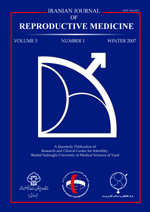
|
International Journal of Reproductive BioMedicine
Research and Clinical Center for Infertility, Shahid Sadoughi University of Medical Sciences of Yazd
ISSN: 1680-6433
EISSN: 1680-6433
Vol. 11, No. 12, 2013, pp. 1005-1112
|
 Bioline Code: rm13127
Bioline Code: rm13127
Full paper language: English
Document type: Research Article
Document available free of charge
|
|
|
International Journal of Reproductive BioMedicine, Vol. 11, No. 12, 2013, pp. 1005-1112
| en |
Does dietary fat intake influence oocyte competence and embryo quality by inducing oxidative stress in follicular fluid?
Kazemi, Ashraf; Ramezanzadeh, Fatemeh; Nasr-Esfahani, Mohammad Hosein; Yaraghi, Ali Akbar Saboor & Ahmadi, Mehdi
Abstract
Background: Fat-rich diet may alter oocyte development and maturation and
embryonic development by inducing oxidative stress (OS) in follicular environment.
Objective: To investigate the relationship between fat intake and oxidative stress with oocyte competence and embryo quality.
Materials and Methods: In observational study follicular fluid was collected from 236 women undergoing assisted reproduction program. Malon-di-aldehyde (MDA) levels and total antioxidant capacity (TAC) levels of follicular fluid were assessed as oxidative stress biomarkers. In assisted reproduction treatment cycle fat consumption and its component were assessed. A percentage of metaphase Ι stage oocytes, fertilization rate were considered as markers of oocyte competence and non-fragmented embryo rate, mean of blastomer and good cleavage (embryos with more than 5 cells on 3 days post insemination) rate were considered as markers of embryo quality.
Results: The MDA level in follicular fluid was positively related to polyunsaturated fatty acids intake level (p=0.02) and negatively associated with good cleavage rate (p=0.045). Also good cleavage rate (p=0.005) and mean of blastomer (p=0.006) was negatively associated with polyunsaturated fatty acids intake levels. The percentage of metaphase Ι stage oocyte was positively related to the TAC levels in follicular fluid (p=0.046). The relationship between the OS biomarkers in FF and the fertilization rate was not significant.
Conclusion: These findings revealed that fat rich diet may induce the OS in oocyte environment and negatively influence embryonic development. This effect can partially be accounted by polyunsaturated fatty acids uptake while oocyte maturation is related to TAC and oocytes with low total antioxidant capacity have lower chance for fertilization and further development.
Keywords
Dietary Fat; Oxidative stress; Follicular fluid; Oocyte competence; Embryo Quality; Malon-de-aldeid; Total antioxidant capacity
|
| |
© Iranian Journal of Reproductive Medicine
Alternative site location: http://www.ijrm.ir
|
|
